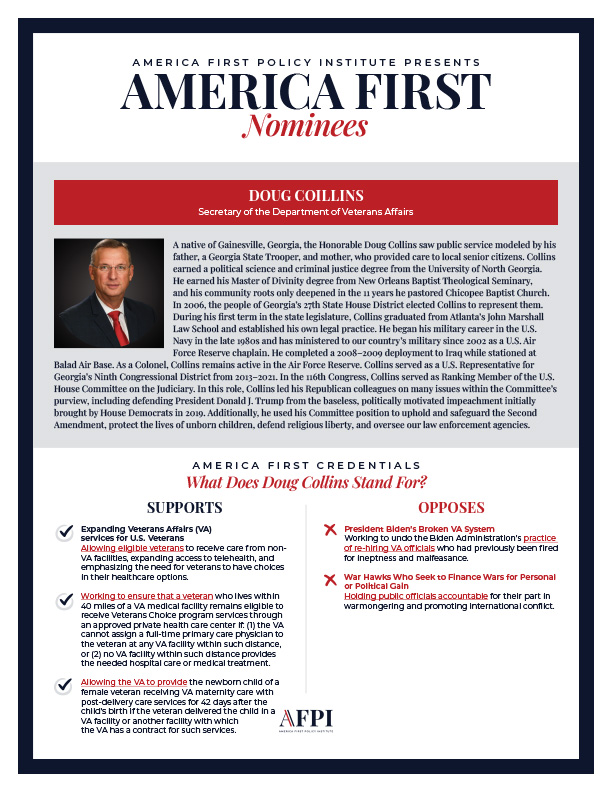America First Nomination: Doug Collins
Biography
A native of Gainesville, Georgia, the Honorable Doug Collins saw public service modeled by his father, a Georgia State Trooper, and mother, who provided care to local senior citizens. Collins earned a political science and criminal justice degree from the University of North Georgia. He earned his Master of Divinity degree from New Orleans Baptist Theological Seminary, and his community roots only deepened in the 11 years he pastored Chicopee Baptist Church. In 2006, the people of Georgia’s 27th State House District elected Collins to represent them. During his first term in the state legislature, Collins graduated from Atlanta’s John Marshall Law School and established his own legal practice. He began his military career in the U.S. Navy in the late 1980s and has ministered to our country’s military since 2002 as a U.S. Air Force Reserve chaplain. He completed a 2008–2009 deployment to Iraq while stationed at Balad Air Base. As a Colonel, Collins remains active in the Air Force Reserve. Collins served as a U.S. Representative for Georgia’s Ninth Congressional District from 2013–2021. In the 116th Congress, Collins served as Ranking Member of the U.S. House Committee on the Judiciary. In this role, Collins led his Republican colleagues on many issues within the Committee’s purview, including defending President Donald J. Trump from the baseless, politically motivated impeachment initially brought by House Democrats in 2019. Additionally, he used his Committee position to uphold and safeguard the Second Amendment, protect the lives of unborn children, defend religious liberty, and oversee our law enforcement agencies.
America First Credentials
Supports
Expanding Veterans Affairs (VA) services for U.S. Veterans
- Allowing eligible veterans to receive care from non-VA facilities, expanding access to telehealth, and emphasizing the need for veterans to have choices in their healthcare options.
- Working to ensure that a veteran who lives within 40 miles of a VA medical facility remains eligible to receive Veterans Choice program services through an approved private health care center if: (1) the VA cannot assign a full-time primary care physician to the veteran at any VA facility within such distance, or (2) no VA facility within such distance provides the needed hospital care or medical treatment.
- Allowing the VA to provide the newborn child of a female veteran receiving VA maternity care with post-delivery care services for 42 days after the child’s birth if the veteran delivered the child in a VA facility or another facility with which the VA has a contract for such services.
- Expanding access to mental health, legal, and transitional services to eligible veterans who have been incarcerated.
- Directing the Department of Justice to establish a Veterans Treatment Court Program to provide grants and technical assistance for state, local, and tribal governments to develop and maintain veterans’ treatment courts.
Rooting Out Corruption in the VA
- Empowering the Office of Accountability and Whistleblower Protection to further its work advising the VA on accountability matters, including whistleblower disclosures, retaliation, and senior executive misconduct.
- Advocating for the removal or demotion of employees of the VA based on unsatisfactory performance or misconduct.
- Requiring the VA Secretary to submit an annual report regarding performance awards and bonuses given to certain high-level employees of the VA.
Ending Veteran Homelessness
Working to curb inflation and lower costs, creating a sustainable environment where veterans and all Americans can afford necessities and avoid becoming homeless.
Preventing Crimes Against Veterans
Establishing a new criminal offense for knowingly executing or attempting to execute a scheme to defraud an individual of veterans’ benefits.
Ensuring Naturalization for Children of Veterans and Active-Duty Members Born on Deployment
Working to amend U.S. Citizenship and Immigration Services’ interpretation of immigration statutes, which state that some children of U.S. Armed Forces members would not automatically acquire citizenship merely because their parents’ deployment abroad prevents them from meeting the residency requirement imposed in the statute.
Lowering Taxes for Hardworking Veterans
Cutting income taxes in states like Georgia to provide relief for hardworking Americans, especially veterans.
Opposes
President Biden’s Broken VA System
War Hawks Who Seek to Finance Wars for Personal or Political Gain
Holding public officials accountable for their part in warmongering and promoting international conflict.
America First Achievements
Throughout his career, Doug Collins has worked hard to create significant America First accomplishments in Georgia while also ensuring America First nationally through the following:
Bringing America First to Georgia by helping establish the America First Policy Institute’s state chapter in Georgia, creating a lasting America First presence, and delivering substantial policy wins in the state.
Co-Sponsoring H.R.4803, the Citizenship for Children of Military Members and Civil Servants Act, which became law in 2020. This legislation established that a foreign-born child of a U.S. citizen member of the Armed Forces or government employee may automatically acquire U.S. citizenship even if the child is not residing there.
Co-Sponsoring H.R.2147, the Veterans Treatment Court Improvement Act of 2018, which became law in 2018. This legislation required the VA to hire at least 50 Veterans Justice Outreach Specialists under the Veterans Justice Outreach Program.
Co-Sponsoring H.R.1162, the No Hero Left Untreated Act, which became law in 2018. This legislation required the VA to carry out a one-year pilot program to provide access to magnetic EEG/EKG-guided resonance therapy to treat veterans suffering from post-traumatic stress disorder, traumatic brain injury, military sexual trauma, chronic pain, or opiate addiction.
Co-Sponsoring H.R.4352, the Faster Care for Veterans Act of 2016, which became law in 2016. This legislation directed the VA to begin an 18-month pilot program in at least three Veterans Integrated Service Networks under which veterans use an Internet website or mobile application to schedule and confirm appointments at VA medical facilities.
Co-Sponsoring H.R.5441, legislation to amend the federal charter of the Veterans of Foreign Wars of the United States to reflect the service of women in the Armed Forces of the United States, which became law in 2014.
